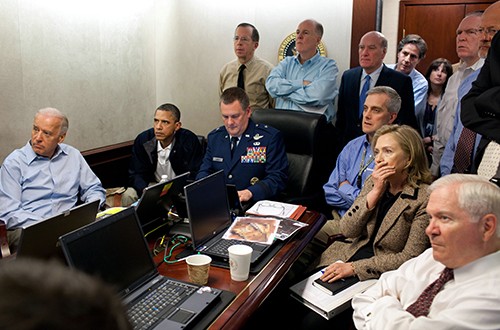WASHINGTON — From buying nuclear radiation detectors to putting droves of air marshals on passenger flights, the U.S. government has spent hundreds of billions of dollars since the Sept. 11 attacks to build defenses around every major target of terrorism.
The death of Osama bin Laden doesn’t end those threats.
But while the ability of the remaining al-Qaida network to punch back is unclear, some experts say that it’s time, particularly amid a severe U.S. budget crunch, to determine if any of those vast homeland security programs are bloated, redundant or unnecessary.
“”A thorough review is entirely appropriate,”” said Brian Jenkins, a counterterrorism expert for the Rand Corp. “”Not simply for the purposes of slashing budgets, but for saying, ‘OK, what are we doing here? And how well are we doing it?'””
George Foresman, a former homeland security undersecretary from 2005 to 2007, agreed.
“”Maybe it’s time to take a hard look at what we’ve done to secure America — not just from terrorist threats, but also from natural disasters. We won’t find out where we’re not strong until we have the next ‘Oh, crap’ moment, when we’ll say we should have looked at this and been better prepared.””
The takedown of al-Qaida’s leader also offers an opportunity to reassess the U.S. involvement in wars in Iraq, Afghanistan and Libya, said Randall Larsen, a counterterrorism expert at the National Defense University in Washington.
“”The debt of this country is perhaps a greater threat to our long-term national security than terrorists,”” Larsen said. “”We are spending $2 billion a week in Afghanistan for what Gen. (David) Petraeus and the director of the CIA said were about 100 members of al-Qaida. How many troops do we have? How much money are we spending?””
But is slashing such spending politically feasible when a president is seeking re-election in a highly partisan climate?
Since his biggest national security triumph Sunday, President Barack Obama’s administration has given no hint of changing course on the fight against al-Qaida and other terrorist groups.
“”The fight is far from over,”” Attorney General Eric Holder told the House Judiciary Committee Tuesday. “”Today, we must be united by a collective resolve and a common purpose to protect our homeland.””
One reason for caution is that the potency of al-Qaida and its fragmented allies is unknown.
“”We’ve still got enemies out there, both organized and unorganized. This doesn’t change anything,”” said Michael Greenberger, a former Clinton administration counterterrorism adviser who heads the University of Maryland’s Center for Health and Homeland Security. “”Some people would argue that with bin Laden’s death, the threat is even greater because there’s an incentive to retaliate.””
However, at a time of multitrillion-dollar budget deficits, Congress and the president may have little choice but to cap the gusher of counterterrorism spending, including more than $80 billion in annual intelligence spending and tens of billions spent by other agencies.
For example, Congress is requiring the Department of Homeland Security to screen 100 percent of the cargo arriving at U.S. seaports. Larsen said, however, that the radiation detectors used at the ports couldn’t detect a Hiroshima-sized bomb wrapped in aluminum foil, and that it would be easy to put a milk jug holding a dirty bomb in the trunk of one of 800,000 cars arriving, uninspected, at the same seaports.
After the 9/11 hijackings and a series of other al-Qaida attempts to blow up passenger jets, U.S. officials added locked, armored cockpit doors and full-body passenger screening. Some question whether it was necessary to also dispatch unidentified, armed air marshals on selected flights.
However, money for emergency response programs by state and local governments should be protected, said Frank Cilluffo, a former Bush administration counterterrorism adviser. If Congress trims homeland security, he said, “”maybe it means less money on trinkets and more money on building out intelligence.””
Well before the bin Laden killing, Jenkins flew to Williamsburg, Va., in January to appear at a retreat for freshmen members of Congress, including newly elected tea party members bent on slashing federal spending. He suggested that the 10th year since Sept. 11 was a time to review all the counterterrorism measures put in place since the attacks.
“”Right after Sept. 11, we did a lot of things because there was a great deal of uncertainty,”” Jenkins said. “”We had no idea of how many more 9/11s might be in the pipeline — large-scale operations.””
As a result, he said, U.S. officials became too caught up in identifying major vulnerabilities, instead of focusing on actual terrorist threats.
In an “”open industrialized, technology-dependent society,”” he said, vulnerabilities are “”virtually infinite.””
The current climate, he said, offers a chance for America to revisit those decisions and “”get smarter.””









